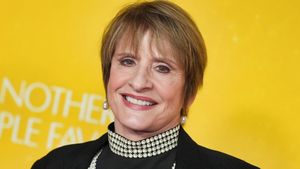Pope Francis has indicated openness to blessing of same-sex relationships in the Roman Catholic Church, with caveats that such blessings should not become the norm and the unions should not be considered equivalent to marriage.
In response to queries from five cardinals, the pope also suggested the possibility of opening the priesthood to women. On both topics, Francis’s position is far from a full-on endorsement of change in doctrine that has stood for millennia, but his words are being seen as progress.
The cardinals, all retired conservatives who have been critical of Pope Francis, submitted their questions a few months ago. All their queries deal with subjects of controversy in the church. They were apparently dissatisfied with the pope’s lengthy answers, so they followed up by asking for yes or no replies. That has not been forthcoming, so they published the questions Monday, two days ahead of a major church meeting, the Synod on Synodality. The Vatican then published Francis’s answers.
On blessings for same-sex unions, the pope wrote that only “an exclusive, stable, and indissoluble union between a man and a woman, naturally open to the begetting of children” can be considered marriage. But he allowed that “pastoral prudence must adequately discern whether there are forms of blessing, requested by one or more persons, that do not transmit a mistaken conception of marriage. For when a blessing is requested, one is expressing a request for help from God, a plea for a better life, a trust in a Father who can help us to live better.”
However, decisions to offer these blessings “should not necessarily become a norm,” he added. “That is to say, it is not appropriate for a diocese, an episcopal conference or any other ecclesial structure to constantly and officially authorize procedures or rites for all kinds of matters.”
He also noted that “there are situations that from an objective point of view are not morally acceptable,” but clergy “cannot become judges who only deny, reject, exclude.”
This is a shift from the language in a document the Vatican released with the pope’s approval in 2021, saying God, and by extension the Catholic Church, “does not and cannot bless sin.” The church holds that acting on same-sex desires is indeed a sin.
On the question of legal recognition of same-sex couples, separate from church blessing, the pope has endorsed civil unions and noted that governments have the right to go beyond that and enact equal marriage rights. In 2010, when Argentina was considering legal marriage equality and Francis was archbishop of Buenos Aires, he advocated for civil unions instead. The nation did end up adopting equal marriage rights.
“Cynics say [Francis’s position] was a ploy to limit the rights of gay couples, to keep marriage exclusively for heterosexuals,” Catholic journalist Michael O’Loughlin wrote in 2015. “Given that Francis has proven himself a shrewd tactician and skilled political operative, it’s more likely that Francis understood the need for mercy.”
Regarding women in the priesthood, the pope wrote that when one of his predecessors, Pope John Paul II (now a saint), said the priesthood must remain men-only, “he was in no way belittling women and granting supreme power to men.” Francis continued, “If this is not understood and the practical consequences of these distinctions are not drawn, it will be difficult to accept that the priesthood is reserved only to men and we will not be able to recognize the rights of women or the need for them to participate, in various ways, in the leadership of the Church.” He added that the ordination of women “can be the object of study, as is the case with the validity of ordinations in the Anglican Communion.”
Although church doctrine on these matters almost certainly won’t change anytime soon, leaders of LGBTQ+ Catholic groups were encouraged by the pope’s words. “Though the Vatican’s latest statement about same-gender couples does not provide a full-fledged, ringing endorsement of blessing their unions, the document significantly advances Pope Francis’ work to include and affirm LGBTQ+ people,” said a statement from Francis DeBernardo, executive director of New Ways Ministry.
The document “allows for pastoral ministers to administer such blessings on a case-by-case basis, advising that ‘pastoral prudence’ and ‘pastoral charity’ should guide any response to couples who request a blessing,” DeBernardo continued. “It also indicates that permitting such blessings cannot be institutionalized by diocesan regulations, perhaps a reference to some dioceses in Germany where blessings are already taking place with official and explicit permission.”
“The allowance for pastoral ministers to bless same-gender couples implies that the church does indeed recognize that holy love can exist between same-gender couples, and the love of these couples mirrors the love of God,” he added. “Those recognitions, while not completely what LGBTQ+ Catholics would want, are an enormous advance towards fuller and more comprehensive equality. This statement is one big straw towards breaking the camel’s back of the marginalized treatment LGBTQ+ people experience in the Church.”
Marianne Duddy-Burke, executive director of DignityUSA, issued this statement: “While we continue to believe that legal and sacramental marriage equality is the goal, Pope Francis’s statement that there may be ways for the church to bless same-sex couples is an unexpected and welcome sign of openness. The sacredness and grace in the relationships between people of the same sex, or where one or more partner is transgender, deserve affirmation and support. Hearing the Pope acknowledge this will give hope to many Queer people, as well as to their families and friends who are Catholic.”
“It is notable that this comment was made in writing, and in a letter to Cardinals who represent very traditionalist views and seemed to be hoping for support for their position. In his response, the Pope appeared to warn them that the church’s ministers cannot only ‘deny, reject, and exclude,’” she added. “Furthermore, he has not penalized priests and bishops in Europe who have performed such blessings and has not prevented national bishops’ conferences from considering offering these blessings as part of their pastoral practices. These are all signs that our church’s leaders are beginning to engage with these fundamental questions around sexual orientation, gender, and relationships in new ways. I find that encouraging.”













































































